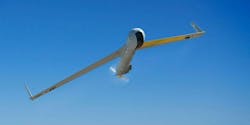U.S. Navy orders 15 ScanEagle unmanned aircraft, sensor payloads, and video data links for Afghanistan
LAKEHURST, N.J. – U.S. Navy unmanned aircraft experts are buying 15 small reconnaissance unmanned aerial vehicles (UAVs) and onboard sensor payloads for Afghanistan under terms of a $9.8 million contract announced earlier this month.
Officials of the Naval Air Warfare Center Aircraft Division in Lakehurst, N.J., are asking Boeing Insitu Inc. in Bingen, Wash., to provide 15 ScanEagle UAVs for Afghanistan National Army intelligence, surveillance, and reconnaissance (ISR).
The Boeing Insitu ScanEagle UAV is 5.1 feet long with a 5.6-foot wingspan. It weighs as much as 48.5 pounds and can carry a 7.5-pound sensor payload. The UAV can fly for more than 24 hours at altitudes as high as 19.500 feet, and at speeds to 80 knots.
The ScanEagle UAV can fly on gasoline or heavy fuels like jet fuel, diesel, or kerosine. It provides persistent surveillance and reconnaissance imagery on land or at sea at lower costs than other surveillance methods for military and agriculture missions.
Related: Air Force chooses Harris to build HH-VDL video data link radios for situational awareness
ScanEagle can carry a sensor payload consisting of visible-light camera, medium-wave infrared imager, or both integrated in one turret. The UAV ans has an analog digitally encrypted video data links, as well as encrypted or unencrypted command-and-control data links.
The UAV can be launched autonomously and uses a no-nets recovery system that recovers with its wing tip on a rope that hangs from a boom.
On this contract Insitu will do the work in Bingen, Wash., and should be finished by July 2021. For more information contact Boeing Insitu online at www.insitu.com, or the Naval Air Warfare Center Aircraft Division at www.navair.navy.mil/nawcad.
About the Author
John Keller
Editor-in-Chief
John Keller is the Editor-in-Chief, Military & Aerospace Electronics Magazine--provides extensive coverage and analysis of enabling electronics and optoelectronic technologies in military, space and commercial aviation applications. John has been a member of the Military & Aerospace Electronics staff since 1989 and chief editor since 1995.
